Communication in the workplace is important because it boosts employee morale, engagement, productivity, and satisfaction. Communication is also key for better team collaboration and cooperation. Ultimately, effective workplace communication helps drive better results for individuals, teams, and organizations.

To take it a step further, specifically as a manager, building good communication skills has profound short- and long-term benefits for your organization. An effective communicator can motivate their team to get more done with better results and fewer misunderstandings.

Effective communication is about active listening — while it may seem counter-intuitive, a “listener-first” approach will often help you structure the delivery of your message
Here are 7 more tips for developing your communication skills.
1. Think it through
There are many communications frameworks, but if you want to improve your communication skills, start by getting in the habit of thinking through these 5 questions for any communication you create:
- Why are you communicating?
- Who is the receiver, audience, or participant?
- What is your goal or objective?
- What do you want the recipient to do because of the communication?
- What format will best accomplish your goal?
If you struggle to answer these five questions, you should spend some additional time thinking about how and why you’re communicating. Then, test your understanding with co-workers or your manager.
2. Give it time
Plan what you want to say and review your communication to make sure it’s doing the job you need it to. For written communications, especially, this means revise, revise, revise. Remember, great communication might seem effortless, but it rarely is.
3. Make it easy
Workplace communication almost always has a larger goal. People are busy. Don’t make them work too hard to understand what you are saying and what you need them to do. State your objective and main point from the beginning of a presentation or written communication so that your audience knows where you’re going. Then fill in the details.
4. Simplify
While you don’t want to condescend or “dumb it down,” in everyday work communications, be mindful of not making the other party work too hard to understand. Find a clear, simple phrasing to encapsulate your point. Repeat it at the beginning, middle, and end, and consider using a simple visual or metaphor to make your point clear and memorable.
5. Experiment and diversify
Work on developing different tactics for different communication needs. Focus on experimenting with one aspect of your communication at a time. For example, spend a week paying extra attention to how you structure informal communications. Then spend a week trying different structures for formal meetings or updates.
6. Practice and reflect
Be deliberate about reflecting on what goes well and what doesn’t in your day-to-day communications. Maybe an email to your manager didn’t go well. Can you see how it might have been misinterpreted? What would you do differently next time? Similarly, if a conversation with a co-worker didn’t yield the expected results, try to identify whether you clearly communicated what you needed.
7. Consider the full package
Consider recording yourself through a few interactions to gain insight into what your full package is communicating in your daily interactions with your team. Do you make eye contact? Is your facial expression relaxed and confident, or tense? How’s your body language? Do you leave time for questions and clarification?
8. Seek feedback
Ask a few trusted co-workers and your manager to rate your communication skills. Start by asking them to rate (i.e., on a scale of 1-10) your written and spoken communication separately. Then ask these 3 questions:
- What one thing should I start doing to communicate better with you?
- What one thing should I stop doing in my communications with you?
What one area or skill should I work on to improve how I communicate in this organization?
Every year communication tops the list of skills in demand by employers. There’s a reason. Communication is what makes our professional and personal relationships go smoothly. It’s how we show care, catalyze change, and get things done. Business coaching for your team and you can help with this skill.
Elevate Your Communication Skills with Our Exclusive Training Program!
That’s why we’re excited to announce our upcoming Communication Training Program designed specifically for professionals like you. This comprehensive program will equip you with the skills and strategies needed to excel in various communication scenarios, empowering you to:
- Master the art of public speaking and presentations.
- Enhance your interpersonal communication skills.
- Build rapport and influence others effectively.
- Navigate challenging conversations with confidence.
- Develop a compelling personal brand through communication.
